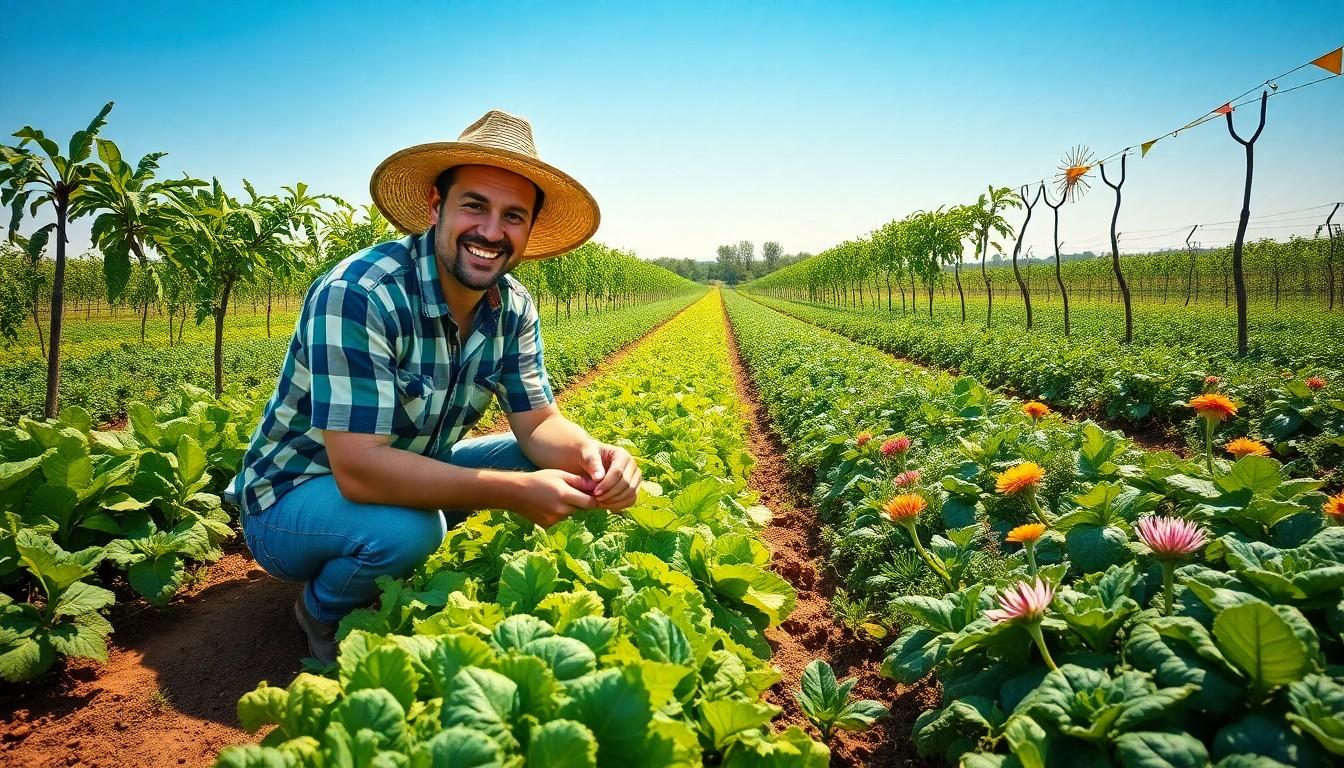In a world where the phrase “you are what you eat” has never been truer, organic farming stands out like that one friend who insists on bringing kale chips to the party. It’s not just a trendy buzzword; it’s a movement that’s reshaping how we think about food and sustainability. Organic farming offers a healthier alternative to conventional practices, promising fresher produce and a lower impact on the environment.
Importance Of Organic Farming
Organic farming offers numerous benefits that extend beyond just food production. Healthier food choices stand out as a primary advantage, as organic produce contains fewer synthetic pesticides and fertilizers. Higher nutrient levels in organic crops contribute to a balanced diet, leading to improved overall health.
Environmental sustainability represents another critical aspect of organic farming. This practice fosters biodiversity by encouraging a variety of plant and animal species to thrive. Soil health benefits greatly from organic techniques, which enhance microbial activity and improve nutrient cycling. Reduced water pollution results from the absence of harmful chemical runoff commonly associated with conventional farming.
Economic viability gains importance in local communities through organic farming. Farmers benefiting from organic certification often receive higher prices for their products. This price premium supports small-scale farmers and promotes local economies, enabling them to thrive. Job opportunities also increase in organic farming sectors, contributing to economic growth.
Consumer awareness plays a pivotal role in the rising demand for organic products. As consumers prioritize health and environmental issues, they actively seek organic options. This shift influences retailers to expand their organic product offerings, making them more accessible to everyone.
Organic farming’s significance transcends personal health and environmental protection. By reducing ecological footprints, it actively combats climate change. Organic methods contribute to carbon sequestration in soil, creating a more resilient agricultural system. This comprehensive approach combines public health, environmental stewardship, and economic benefits, underlining the essential role of organic farming in society today.
Environmental Benefits

Organic farming provides significant environmental advantages that foster a healthier ecosystem. Practices employed in organic farming reduce chemical inputs, contributing to cleaner air and water.
Soil Health Improvement
Soil health sees remarkable enhancement through organic farming methods. Organic techniques increase microbial activity, which boosts soil fertility and structure. Cover crops and crop rotations improve nutrient cycles and reduce erosion. Organic matter enriches the soil, allowing it to retain moisture and support plant growth effectively. Healthier soil can sequester more carbon, making organic practices a proactive approach to mitigating climate change.
Biodiversity Conservation
Biodiversity conservation thrives in organic farming environments. Organic farms often host a wider variety of species, including beneficial insects, birds, and soil organisms. These diverse ecosystems create natural pest control mechanisms, reducing reliance on pesticides. Preservation of native plants fosters habitats that sustain local wildlife and pollinators essential for food production. Moreover, maintaining genetic diversity in crops enhances resilience against pests and diseases, safeguarding food security in the long run.
Health Benefits
Organic farming significantly contributes to better health outcomes. Healthier food options arise from reduced chemical use, leading to less exposure to harmful substances.
Reduction Of Chemical Exposure
Organic farming reduces synthetic pesticides and fertilizers. This reduction lowers the risk of chemical residue on food products. Consumers benefit from minimal exposure to potentially harmful agricultural chemicals. Research shows that people who consume organic produce experience fewer health issues linked to chemical exposure, such as allergies and certain chronic diseases. Additionally, organic practices promote safer farming environments for agricultural workers, enhancing overall community health.
Nutritional Value
Nutritional value stands out as a primary benefit of organic products. Organic crops often contain higher levels of antioxidants, vitamins, and minerals compared to conventionally grown produce. Studies indicate that organic fruits and vegetables can have up to 40% more antioxidants, which help combat free radicals. Enhanced soil health and natural fertilizers contribute to richer nutrient profiles in organic crops. Eating organic foods therefore leads to improved overall nutrition, supporting better immune function and long-term health.
Economic Impact
Organic farming significantly contributes to economic viability and supports sustainable livelihoods for farmers. It opens new avenues for income through premium pricing on organic products, allowing farmers to earn more compared to conventional methods.
Sustainable Livelihoods
Farmers engaged in organic practices often experience financial stability. They capitalize on the growing consumer preference for organic goods. With higher product prices, organic farmers can invest in better farming techniques and community development. The organic sector also creates diverse job opportunities, from farming roles to positions in processing and retail. Local economies benefit as money circulates within communities, leading to a more robust agricultural sector. Sustainable practices reduce dependency on external inputs, promoting resilience against market fluctuations.
Market Demand
Rising demand for organic products reflects a shift in consumer behavior. Surveys show that over 70% of consumers prefer organic options due to health and environmental concerns. Retailers are expanding their organic selections to meet this trend. As new organic brands emerge, competition drives innovation and quality in the market. Many families consider organic purchases essential, believing these foods provide nutritional advantages. This burgeoning market enhances the economic landscape for organic farmers, reinforcing the importance of organic farming for economic sustainability.
Challenges In Organic Farming
Organic farming faces several significant challenges that can affect its growth and implementation. These obstacles hinder some farmers from transitioning to organic practices.
Certification Process
Obtaining organic certification involves a rigorous process. Farmers must adhere to strict guidelines and standards set by certifying bodies. Documentation of practices and inputs is essential during the evaluation, which can last several months. Annual inspections also add to the complexity of maintaining certification. Failure to meet specific requirements can result in loss of certification, creating additional stress for farmers.
Cost And Accessibility
Higher initial costs often accompany organic farming. Organic seeds, fertilizers, and soil amendments frequently cost more than their conventional counterparts. Often, small-scale farmers struggle to afford these inputs and the necessary transition period. Accessibility to certified organic materials presents another issue, particularly in rural areas. Limited availability can deter farmers from adopting organic methods, despite growing consumer demand for organic products.
Crucial for Fostering Growth
Organic farming stands as a vital component of a sustainable future. By prioritizing health and environmental integrity, it not only provides nutritious food but also enhances biodiversity and soil health. The economic benefits for farmers and local communities further underscore its importance in today’s market.
As consumer demand for organic products continues to rise, embracing organic practices becomes essential. This shift not only supports healthier lifestyles but also contributes to a more resilient agricultural system. Addressing the challenges faced by organic farmers is crucial for fostering growth and ensuring that this movement thrives for generations to come.

